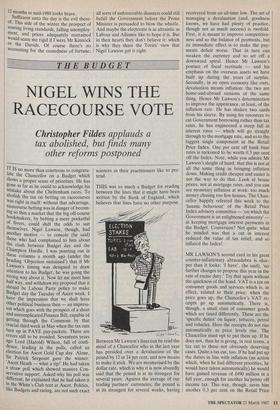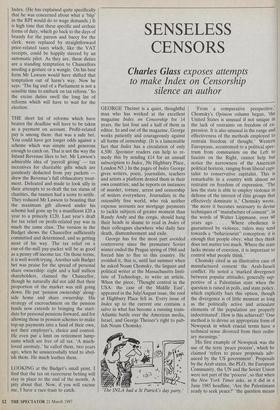THE BUDGET
NIGEL WINS THE RACECOURSE VOTE
Christopher Fildes applauds a
tax abolished, but finds many other reforms postponed
IT IS no more than courteous to congratu- late the Chancellor on a Budget which shows a proper sense of priorities. He has gone as far as he could to acknowledge his mistake about the Cheltenham races. To abolish the tax on betting on racecourses was right in itself: without that advantage, racecourse betting was in danger of becom- ing so thin a market that the big off-course bookmakers, by betting a mere pocketful of fivers, could shift the odds to suit themselves. Nigel Lawson, though, had another motive — to console (he said) those who had complained to him about the clash between Budget day and the Champion Hurdle. I was pointing out in these columns a month ago (under the heading 'Objection sustained') that if Mr Lawson's timing was designed to draw attention to his Budget, he was going the wrong way about it. Now let me meet him half way, and withdraw my proposal that it should be Labour Party policy to make Budget day the Tuesday of Ascot week. I have the impression that we shall have other political business then — an impress- ion which goes with the prospect of a short and uncomplicated Finance Bill, capable of getting through the Commons by that crucial third week in May when the tax cuts turn up in PAYE pay-packets. There are errors still to be avoided. Seventeen years ago Lord (Harold) Wilson, full of confi- dence, leading in the polls, called an election for Ascot Gold Cup day. Alone, Sir Patrick Sergeant gave the winner: `Ascot Heath — what a tip!' He had taken a straw poll which showed massive Con- servative support. Asked why his poll was different, he explained that he had taken it in the White's Club tent at Ascot. Politics, like Budgets and racing, are not such exact sciences as their practitioners like to pre- tend.
THIS was so much a Budget for reading between the lines that it might have been written by the Bank of England, which believes that lines have no other purpose.
Between Mr Lawson's lines can be read the mind of a Chancellor who in the last year has presided over a devaluation of the pound by 12 or 14 per cent, and now means to make it stick. We are mesmerised by the dollar rate, which is why it is now absurdly said that the pound is at its strongest for several years. Against the average of our trading partners' currencies, the pound is at its strongest for several weeks, having recovered from an all-time low. The art of managing a devaluation (and, goodness knows, we have had plenty of practice, though not as much success) is twofold. First, it is meant to improve competitive- ness and so the balance of payments, but its immediate effect is to make the pay- ments deficit worse. That in turn can weaken the currency and so set off a downward spiral. Hence Mr Lawson's posture of fiscal rectitude — and his emphasis on the overseas assets we have built up during the years of surplus. Secondly, in an open economy like ours, devaluation means inflation: the two are home-and-abroad versions of the same thing. Hence Mr Lawson's determination to improve the appearance, at least, of the inflation rate. He has shaken two cards from his sleeve. By using his resources to cut Government borrowing rather than tax rates, he has engineered a steep fall in interest rates — which will go straight through to the mortgage rate, and so to the biggest single component in the Retail Price Index. One per cent off bank base rates is reckoned to be worth 0.3 per cent off the Index. Note, while you admire Mr Lawson's sleight of hand, that this is not at all the same thing as bringing inflation down. Making credit cheaper and easier is not the way to do that. Look at house prices, not at mortgage rates, and you can see monetary inflation at work: too much money chasing too few houses. The Chan- cellor happily referred this week to the `lunatic behaviour' of the Retail Price Index advisory committee — 'on which the Government is an enlightened minority' in keeping mortgage interest payments in the Budget. Conversion? Not quite: what he minded was that a cut in interest reduced the value of tax relief, and so inflated the Index!
MR LAWSON'S second card in his great counter-inflationary abracadabra is shar- per than it looks: 'I have', (he said), `no further changes to propose this year in the rate of excise duty.' Try that again without the quickness of the hand. VAT is a tax on consumer goods and services which is, in effect, related to their price: when the price goes up, the Chancellor's VAT re- ceipts go up automatically. There is, though, a small class of consumer goods which are taxed differently. These are the `specific duties' on liquor, tobacco, petrol and vehicles. Here the receipts do not rise automatically as price levels rise. The Chancellor must opt to put them up. If he does not, then he is giving, in real terms, a tax cut to these not obviously deserving cases. Quite a tax cut, too. If he had put up the duties in line with inflation (an action which, when he had different priorities, he would have taken automatically) he would have gained revenue of £490 million in a full year, enough for another ha'penny off income tax. This way, though, saves him another 0.3 per cent on the Retail Price Index. (He has explained quite specifically that he was concerned about what a 'blip' in the RPI would do to wage demands.) It is high time that these specific and archaic forms of duty, which go back to the days of brandy for the parson and baccy for the clerk, were replaced by straightforward price-related taxes which, like the VAT receipts, could be happily steered by an automatic pilot. As they are, these duties are a standing temptation to Chancellors needing a gesture or a wangle. On his best form Mr Lawson would have shifted that temptation out of harm's way. Now he says: 'The fag end of a Parliament is not a sensible time to embark on tax reform.' So the excise duties swell the long list of reforms which will have to wait for the election.
THE short list of reforms which have beaten the deadline will have to be taken as a payment on account. Profit-related pay is among them: that was a safe bet. You could have got longer odds against a scheme which was simple and generous enough to catch on. That is not the way the Inland Revenue likes to bet. Mr Lawson's admirable idea of 'payroll giving' — tax incentives for charitable gifts which are painlessly deducted from pay packets drew the Revenue's full obfuscatory treat- ment. Defeated and made to look silly in their attempts to re-draft the tax status of charities, the taxmen had a score to settle. They reduced Mr Lawson to boasting that the maximum gift allowed under his scheme had gone up by a munificent £20 a year to a princely £120. Last year's draft for tax relief on profit-related pay was in much the same class. The version in the Budget shows the Chancellor sufficiently committed and determined, and so getting most of his way. The tax relief on a run-of-the-mill pay-packet will be as good as a penny off income tax. On those terms, it is well worth trying. Another safe Budget bet was praise for the spread of personal share ownership: eight and a half million shareholders, claimed the Chancellor, though he naturally did not add that their proportion of the market was still going down. He put 'pension ownership' along- side home and share ownership. His strategy of encroachment on the pension funds now extends to bringing the start- date for personal pensions forward, and for allowing those in pension schemes to make top-up payments into a fund of their own, nQt their employer's, choice and control. He even put a limit on retirement lump- sums which are free of all tax. 'A much- loved anomaly,' he called them, two years ago, when he unsuccessfully tried to abol- ish them. -He much loathes them.
LOOKING at the Budget's small print, I find that the tax on racecourse betting will stay in place to the end of the month. A pity about that. Now, if you will excuse me, I have a race-train to catch.



















































 Previous page
Previous page